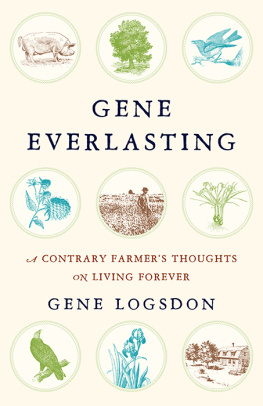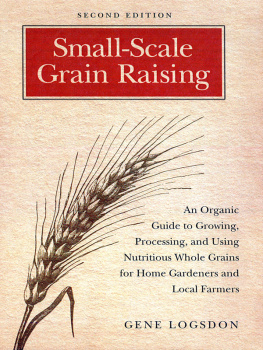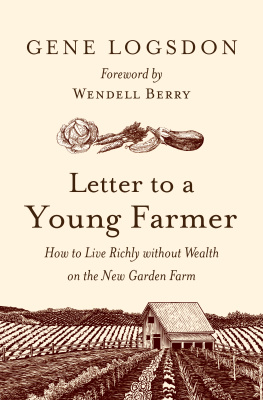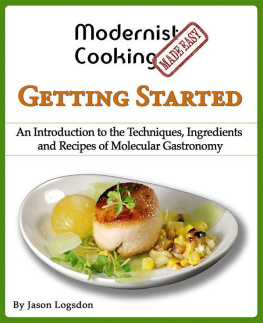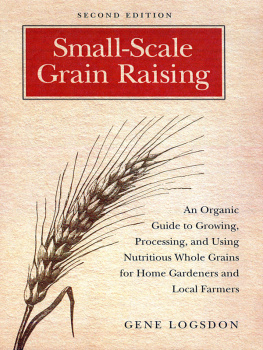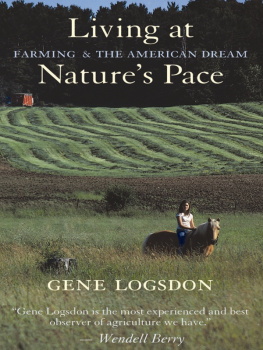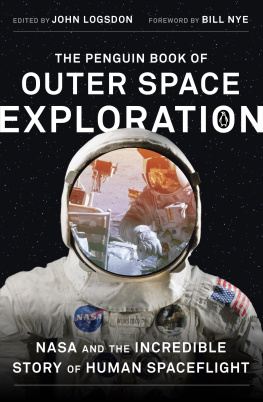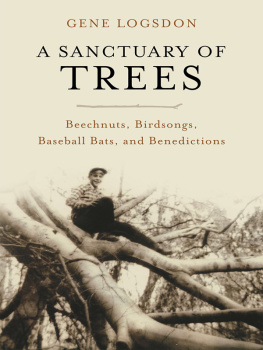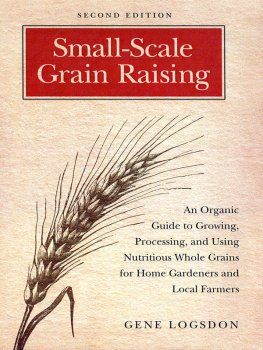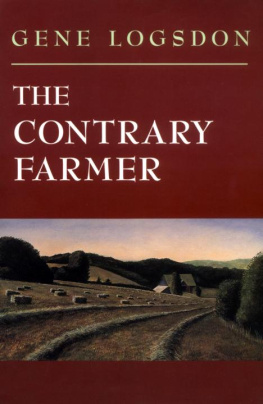
GENE EVERLASTING
OTHER BOOKS BY GENE LOGSDON
Fiction:
Pope Mary and the Church of Almighty Good Food
The Last of the Husbandmen
The Lords of Folly
Nonfiction:
A Sanctuary of Trees
Holy Shit
Small-Scale Grain Raising
The Contrary Farmers Invitation to Gardening
The Pond Lovers
The Mother of All Arts
All Flesh Is Grass
You Can Go Home Again
Good Spirits: A New Look at Ol Demon Alcohol
Living at Natures Pace
The Contrary Farmer
The Low-Maintenance House
Gene Logsdons Practical Skills
Organic Orcharding: A Grove of Trees to Live in
Two-Acre Eden
Getting Food from Water: A Guide to Backyard Aquaculture
The Gardeners Guide to Better Soil
Successful Berry Growing
Homesteading: How to Find New Independence on the Land
Wyeth People: A Portrait of Andrew Wyeth as Seen by His Friends and Neighbors
GENE EVERLASTING

A Contrary Farmers Thoughts on Living Forever
Gene Logsdon
Chelsea Green Publishing
White River Junction, Vermont
Copyright 2014 by Gene Logsdon.
All rights reserved.
No part of this book may be transmitted or reproduced in any form by any means without permission in writing from the publisher.
The cover illustrations and the illustrations on pages 1, 9, 17, 25, 35, 41, 45, 51, 57, 67, 77, 85, 99, 107, 115, 123, 137, 143, and 155 are reproduced from the Educational Technology Clearinghouse ClipArt ETC collection with permission of the Florida Center for Instructional Technology (http://etc.usf.edu/clipart).
The illustration on page 21 is from Wikimedia Commons (http://commons.wikimedia.org/wiki/File:Killdeer_(PSF).png).
Project Manager: Bill Bokermann
Project Editor: Benjamin Watson
Copy Editor: Laura Jorstad
Proofreader: Helen Walden
Designer: Melissa Jacobson
Printed in the United States of America.
First printing January, 2014.
10 9 8 7 6 5 4 3 2 1 14 15 16 17 18
Our Commitment to Green Publishing
Chelsea Green sees publishing as a tool for cultural change and ecological stewardship. We strive to align our book manufacturing practices with our editorial mission and to reduce the impact of our business enterprise in the environment. We print our books and catalogs on chlorine-free recycled paper, using vegetable-based inks whenever possible. This book may cost slightly more because it was printed on paper that contains recycled fiber, and we hope youll agree that its worth it. Chelsea Green is a member of the Green Press Initiative (www.greenpressinitiative.org), a nonprofit coalition of publishers, manufacturers, and authors working to protect the worlds endangered forests and conserve natural resources. Gene Everlasting was printed on FSC-certified paper supplied by Maple Press that contains at least 30% postconsumer recycled fiber.
Library of Congress Cataloging-in-Publication Data
Logsdon, Gene.
Gene everlasting : a contrary farmers thoughts on living forever / Gene Logsdon.
pages cm
ISBN 978-1-60358-539-2 (hardcover) ISBN 978-1-60358-540-8 (ebook)
1. Logsdon, Gene. 2. CancerPatientsPsychology. 3. DeathPsychological aspects. 4. LongevityPsychological aspects. I. Title. II. Title: Contrary farmers thoughts on living forever.
RC265.6.L64A3 2014
362.1969940092dc23
[B]
2013040398
Chelsea Green Publishing
85 North Main Street, Suite 120
White River Junction, VT 05001
(802) 295-6300
www.chelseagreen.com
Contents

PREFACE

A fter I became a cancer survivor, I started to think more about the meaning of mortality and immortality, naturally enough. As I did so, I noticed that a whole lot of other people were doing the same, even though most of them were perfectly healthy. It occurred to me that the more humans disconnected themselves from nature, the more fearful they became of the most natural event in life, that is, death. Maybe that was just my imagination since death has always been feared, but everywhere there seemed to be more novel and imaginative examples of death dread. The priesthood of the Internet was offering a service that would give us the ability to tweet online forever. When your heart stops beating, youll keep on tweeting, said the advance publicity for electronic immortality.
At about the same time, Venezuelas president Hugo Chvez died and his body was being embalmed for posterity as in the days of the pharaohs. Although it didnt really end up that way, his remains would have been preserved and displayed in a museum forever. This struck me as more pathetic than tweeting after death or even freezing dying bodies in the hope that future science could thaw the cadavers out and overhaul them for another run at tweeting in real time. But mummification, however defined, was hardly any more pitiable as a pathway to immortality than the many religious and secular efforts to find life everlasting up there in the misty regions of space everlasting. My computer repairman told me I no longer needed to worry about losing any of my precious words in my document files because they were being automatically backed up in the Cloud, where they would remain inviolate as long as the Electron God so ordained.
Then I learned, as if current events were bent on helping me talk my publisher into doing this book, that so-called death cafs were becoming popular. The first one, as far as I could research, took place in England in 2011, and by 2012 they were all over. Death cafs are gatherings of people who want to talk about dying while dining on tea and cake, or hopefully over alcoholic spirits (the only kind of spirits I am sure exists). The popularity of something seemingly so macabre appeared to stem from an increasing unwillingness to accept religious teachings about life after death. Parental thoughts about going to heaven and spending eternity happily in the arms of Jesus didnt satisfy these people anymore. Nor did they seem to like the Islamic idea in the Koran of enjoying the company of beautiful virgins forever in paradise but no corporeal contact allowed. That would be a kind of hell for me.
If the human race was that driven to gather in death cafs to discuss what lies beyond the grave, I decided my own weird ideas on that topic might not sound too far-fetched. I can promise you, dear reader, that with my way, or rather natures way, if you are a gardener or farmer, when your heart stops beating and you have to stop weeding, you can keep on feeding the soil indefinitely, no Twitter about it. As your body decomposes and folds back into the eternal garden of the food chain, your loved ones will think all the more kindly of you, if for no other reason than at least you will be doing them the favor of not keeping on tweeting.
I write this book believing that the human race, including myself, is irrational. But being irrational is not all that bad. Winter aconites, merrily blooming yellow above a sudden carpet of spring snow, are rather irrational, but the effect is, well, very nice. Human irrationality is extremely un-nice only because humans are genetically predisposed toward violence, a particularly lethal kind of irrationality. Whenever two or more people gather together, they will eventually start killing each other, and even if there were only one human remaining, he or she would probably commit suicide for lack of anyone else to kill. What makes this so maddening is that each and every one of these genetically predisposed killers will strive to do anything to stay alive and to protect, at the risk of their own lives, other people who are not at the moment a threat to them. The whole cultural history of human activity is a true story about people killing with one hand and saving lives with the other.
Next page
